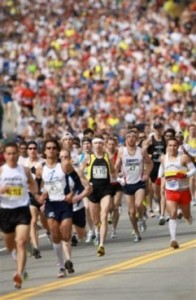 In my previous postI discussed the importance of carb loading the week prior to an endurance event. This helps to help maximize glycogen stores (carbohydrate stores) in the muscles allowing us to exercise for a longer duration without “bonking.”
In my previous postI discussed the importance of carb loading the week prior to an endurance event. This helps to help maximize glycogen stores (carbohydrate stores) in the muscles allowing us to exercise for a longer duration without “bonking.”
Carbohydrate is the primary fuel burned for the first 30-60 minutes of aerobic exercise. It’s also the fuel used when we do anaerobic sprints or hill climbs that leave us out of breath. After about 20 minutes of aerobic exercise the body starts to also use fat as a significant fuel source. The better trained the athlete, the higher percentage of fat the body will use for fuel as exercise continues. This is a great advantage to the well-trained endurance athlete because using fat as a fuel makes the available glycogen last longer. However, even in the best trained athlete carbohydrate is necessary to burn fat as fuel. In sports nutrition we often say “fat burns best in the flame of carbohydrate.” When we run out of glycogen (stored carbohydrate), we bonk – period.
So, how do we keep from running out of glycogen? The strategy is three-fold: 1) Train for endurance to enhance your body’s ability to use fat as a fuel (thus sparing glycogen); 2) carbohydrate load the week prior to your event to maximize glycogen storage, and 3) fuel with carbohydrates before and during exercise to provide an alternate source of carbohydrate so the glycogen stores aren’t used up as quickly.
Ideally, by event day we are endurance trained, carb-loaded and ready to go. Start the day by drinking water; the goal is 20 oz. before leaving for the event. Breakfast is important, and should be something carbohydrate-rich (at least 30-60 gm carbs) with a little bit of protein, but light and easily digested. Examples include oatmeal with dried fruit and milk, yogurt with fruit or whole grain cereal, peanut butter toast, or a breakfast smoothie made with yogurt & fresh or frozen fruit. It should be something your body is used to – no unfamiliar foods on race day!
To optimize your performance and finish strong you will need to continue to fuel and hydrate during your run. The goal is to consume 30-60 gm. of carbohydrate every hour and to drink enough fluids to match those lost in your sweat. This can be accomplished in a number of ways. Consuming a sports drink that contains carbohydrates can serve to meet both needs as well as to supply important electrolytes. For optimal absorption, the sports drink should contain between 6%-8% carbohydrate (14-19 gm. carbs per 8 fluid oz.). A higher concentration of carbohydrates may draw water into the stomach causing “sloshing.” Alternatively, athletes can drink water or carb-free electrolyte drinks as long as they are getting carbohydrates from other sources such as sport gels, blocks, beans, etc. or from “real food” as tolerated. High fat foods are slow to be digested and absorbed, and should be avoided. Once again, it is not recommended to consume new products on event day. Eat and drink things your body is familiar with and that you know are well tolerated. Keep in mind that slowing down to take a drink will more than likely buy you time in the end, enabling you to avoid cramping and perhaps to pass other athletes who are not well fueled and hydrated. So pace yourself, fuel, hydrate, and finish strong!

